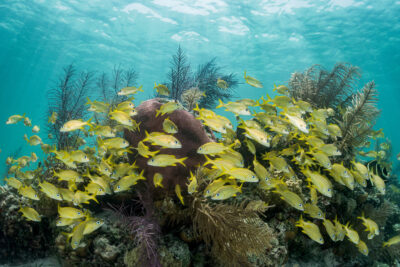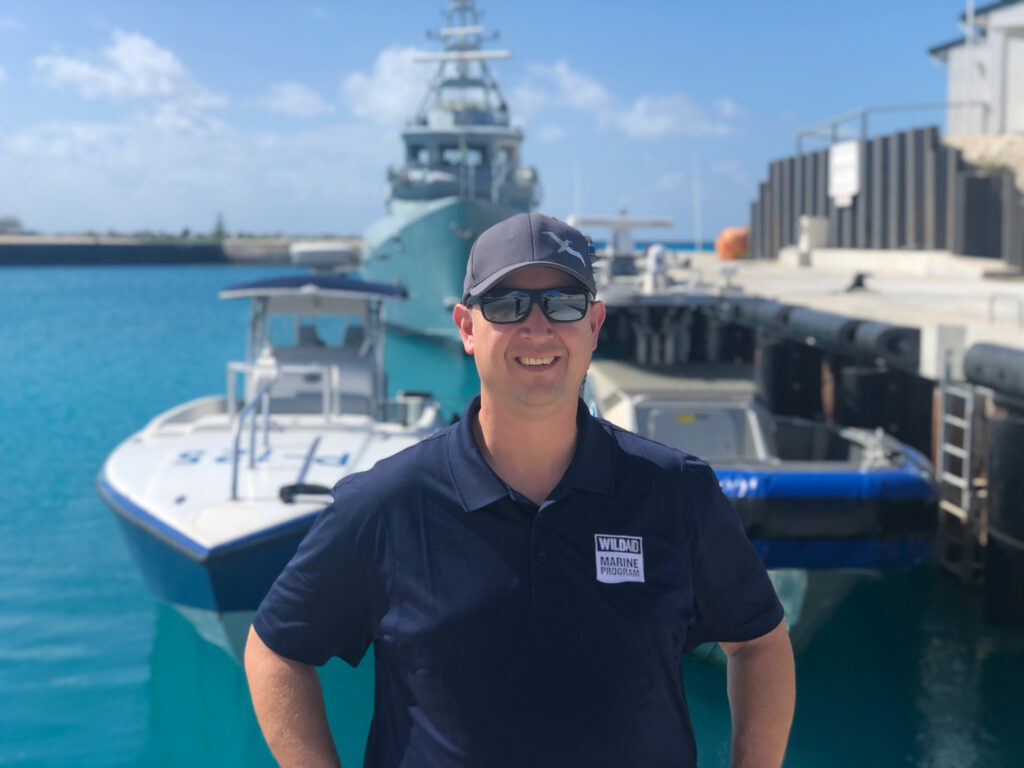
The exquisite tropical islands of The Bahamas are known for their turquoise water, sandy beaches, and diversity of marine life. Just north of the Caribbean Sea, their waters are home to blue marlin, dolphins, corals, and more than 40 species of sharks. It’s an archipelago nation made of 700 islands stretching across nearly a quarter of a million square miles of ocean—an area larger than the state of Texas. Within that span, there are five marine protected areas. Many critically endangered species, including great hammerhead sharks, smalltooth sawfish, and hawksbill turtles, can be found swimming beneath the azure waves.
With this abundance of marine life, The Bahamas’ waters are a target for illegal fishing, which causes great harm to wildlife and their habitats. As a nation that cares deeply about its natural resources, The Bahamas has instituted several laws to discourage illegal and unreported fishing, but because the Economic Exclusive Zone (EEZ) is so vast, local law enforcement found it difficult to adequately patrol and surveil its priority marine areas.
To find improvements, Bahamian officials invited WildAid to help them strengthen patrolling and law enforcement capabilities. Enter Gregg Casad, WildAid Senior Compliance Advisor. He and his teams work in places like Gabon, Tanzania, and the Philippines, helping countries comply with current laws and enhance their abilities to protect fisheries, marine wildlife, coral reefs, and habitats like mangroves and seagrasses.
When WildAid was brought in to help The Bahamas put a stop to illegal fishing, Gregg and his team began first with a deep dive into understanding the specific local challenges. While they worked with government officials and police, they also talked to local fishers, conservationists, and others who had a vested interest in ensuring the health and well-being of their marine resources and treasures.
From those conversations, Gregg learned illegal fishing was rampant. Poachers from the Dominican Republic and the U.S. were damaging coral reefs and putting immense pressure on large populations of marine life. Economically significant species, such as the spiny lobster and queen conch, were affected, as well many threatened reef fish, rays, and sharks.
Reducing and deterring wildlife crime that occurs in such a geographically large area and affects a multitude of species requires a comprehensive plan that takes a holistic, big-picture view. And Gregg, who spent 20 years with the U.S. Coast Guard where he focused on maritime law enforcement, ocean policy, and international capacity building, was up for the task.
WildAid’s marine team has more than 180 years of collective marine enforcement experience, and Gregg and his team tap into this wealth of knowledge to empower governments, organizations, and agencies to enforce their regulations on the ground. They use education, training, and other tools, but ultimately, technological access and expertise are required for the most success.


The Bahamas already had a core level of monitoring in place, so Gregg and his team looked for ways to build upon their current surveillance using advanced technology, knowing it could significantly improve ocean monitoring and enforcement capabilities. They experimented using unmanned surface vehicles that allow real-time vessel location monitoring in Bahamian waters. The data these vehicles provide, combined with customs and permit records, helps determine if vessels are in violation of the law.
Effective monitoring and surveillance play significant and strategic roles when it comes to protecting fish and other marine wildlife in The Bahamas. Another key element in the strategy to deter illegal fishing is the ability to investigate and prosecute crimes. By blending powerful technology with advanced training to investigate illegal fish and wildlife harvesting and trafficking, they dramatically strengthened marine protection across The Bahamas.
Sometimes effective technology is low-tech, especially when it comes to community engagement. Community members were already reporting illegal activity through informal channels such as WhatsApp groups, but there were gaps in the communications. To centralize reporting, Gregg’s WildAid team introduced BAH WildTip, an anonymous reporting line where residents can report unlawful activity such as overfishing, poaching, or the trafficking of endangered species.
Collaborating with the Bahamian government and U.S. agencies, combined with cutting-edge technology and community-driven initiatives, is proving to be a powerful force in the fight against illegal fishing. The Bahamas is seeing real, measurable impact: recently, U.S. authorities intercepted and seized over 300 pounds of illegally imported marine species from The Bahamas.
The work that Gregg and his team have done now serves as a model that WildAid will use in other priority marine areas and countries across the globe.
Your generosity is critical to sustaining these efforts. Because of Gregg’s and WildAid’s efforts, a fully developed Marine Protection System Plan was created to sustain marine life in The Bahamas.
Please consider making a gift today to help us safeguard wildlife, habitats, and the future of conservation. Every donation made before the end of 2024 will be matched, dollar for dollar, up to $300,000!
Your donation can help change the fate of an entire ecosystem.
Stay in touch and get the latest WildAid updates.
SIGN UP